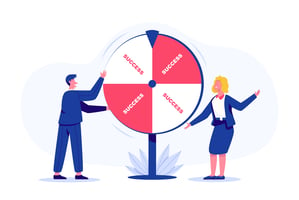How to define always-on marketing?
13 common mistakes in digital marketing for SMBs.
Digital marketing has immense potential for small and medium-sized businesses ( SMB ), but competition is getting tougher. It's no longer enough to have a website, participate in social media, run ads or blog. You need to excel in all of these areas. Below you will find 13 mistakes that companies make when it comes to marketing.

1: Not having an online marketing strategy with reasonable goals and achievable long-term objectives. With the advent of social engines and social media sites, digital marketing is no longer just an option for SMBs, but a priority. Without it, some SMBs might not survive.
2: Using Facebook, Twitter and other social sites for direct advertising. Social media marketing is primarily about connecting with existing customers and building trust with prospects; it's not a platform for direct selling. If you use it only for that purpose, you will fail.
3: You are not running an SEO-friendly blog. For most small and medium-sized businesses, a blog is one of the most effective ways to build authority, make connections with other local business owners, promote your company culture, and value propositions.
4: Not investing in Google AdWords, Bing Ads and Social Media Ads. Digital ads are important traffic sources for SMB websites and if done well, they will increase your leads generation, appointment booking and sales.
5: Failing to provide up-to-date contact information and no current address. The location and phone number are the two most important pieces of information customers look for when visiting your website, and if they are not readily available or outdated, they will send visitors away from your site. It will make your business seems untrustworthy and reduce session time on your pages, and have a direct impact on your bouncing rate and SEO.
6: Sticking with an outdated web design. Content management systems like Hubspot, Wix, or WordPress have improved dramatically the quality of web design because these systems use high-quality, pre-built themes that can be easily customized.
7: The belief that email marketing is dead. Twitter has not supplanted email marketing yet and probably will not anytime soon. That's partly because of the character limit, fake accounts & bots and partly because users log in to Twitter to network, learn or follow the news more than for buying something.
8: You are not trying to understand what your visitors are doing once they reach your site, and what they like or dislike about it. A sophisticated yet easy-to-use analytics tool like Hotjar or Contentsquare will help you improve your design to make your site more inviting and increase conversions.
9: Focusing on quantity rather than quality. This applies to every aspect of your marketing strategy, including website content and blog posts, followers on social media and backlinks. Quality and relevance are key.

10: Neglecting local listings. Being listed on Google/Meta Marketplaces or Shopping, and other similar directories, whether big or small, will put you on the local business map and make it easier for customers to find you.
11: Not requesting feedback/reviews/testimonials. On the Web, positive comments from users improve your image and attract more customers than ads or direct marketing strategies do. It has a big impact on customer trust and will bust sales. Negative feedback doesn't harm you if you use it to identify your faults and correct your mistakes. Use a clear and transparent communication on how you address the issues.
12: Investing more money in ads than in content creation, social media promotion, and web design. Customers who use the Internet need to trust a company before they buy its products and services, and they tend to form a negative image of companies that do not provide quality content/design and a strong message.
13: Failing to make long-term on-site content improvement a priority. It's easier to convince customers to buy from you through content that gives them tips, advice, and solves some of their problems than it is to persuade them with ads.
Despite the immediacy and speed of the Internet, online marketing is no different from offline marketing because it takes time - at least months. Make it a long-term priority and you will succeed. Strategy and planning should be one of your top priorities even if you do not have a full marketing team. Once you have a plan it would be easier for you to correctly use agencies and freelancers on a task-based cost and keep your marketing budget low.

.png?width=50&name=profile-pic%20(8).png)
.jpg?width=344&name=Project%201%20(1).jpg)

.png?height=200&name=Mon%20projet%20(1).png)